Imaging Shows How Stress Leads to Cardiovascular Disease
Stress directly impacts the arteries. Imaging studies enable physicians to actually see the proof, a Boston, MA team reports.

An imaging study due to be presented at the American College of Cardiology's 65th Scientific Session & Expo in Chicago, IL links stress-related amygdala activation with arterial inflammation and eventual cardiovascular disease events.
Amorina Ishai, MD and colleagues at Harvard Medical School used Massachusetts General Hospital’s PET imaging database to access 6008 cases of patients who were screened for cancer between 2005-2008.
The study group of 293 patients, 56% of them women, was created by excluding for active cancer, prior CVD, youth, autoimmune disease, taking anti-inflammatory drugs, or patients with missing or incomplete records.
Testing for evidence of a human counterpart to a known animal stress model the team had mutually blinded teams of radiologists and cardiologists evaluate 18F-FDG PET/CT images and adjudicate any CVD events in patients who had been followed an average of 3.8 years as a group. The results were striking.
“We found that the amygdala measures predicted cardiovascular disease rather robustly” said study co-author co-director of Massachusetts General Cardiac MR PET CT Program Ahmed Tawakol, MD in a press briefing. “The study illuminates, for the first time: relationship between activation of neural tissues (those associated with fear and stress) and subsequent heart disease events”.
Amygdala activity (AA) positively correlated with arterial inflammation (R=0.50, p<0.001). Importantly, AA associated with a greater risk of CVD events.
The significance withstood Framingham Risk Score correction for age and gender (P=0.019) and FRS (P=0.019). Indeed data revealed risk of cardiovascular events to be fourteen times greater at each increment of increase in measured brain stress activity (Cox analysis: HR [95% CI]: 14.1 [4.0-15.0], p<0.001).
According to Tawakol any treatment improvement or practice changes are dependent on further research.
“Future therapies could be pharmacologic but there is also a chance that those behavioral interventions might be effective and very cheap," he said, discussing the study in a conference call with reporters.
"Interestingly enough some prior science suggests that these short term behavioral interventions actually can modulate the size and activity of the stress centers-- whether or not that in turn results in a reduction in arteriosclerotic inflammation and bone marrow activation and more importantly CVD events will need to be assessed prospectively," he noted.